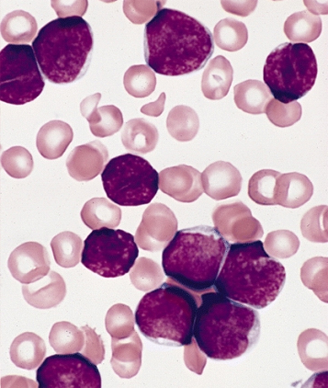Pediatric ALL Protocols Have Low Risk of Late Effects
Long-term outcomes of patients treated for pediatric acute lymphoblastic leukemia (ALL) with modern treatment protocols are good, with an overall low risk for serious long-term side effects.
Bone marrow from a 3-year-old ALL patient

Long-term outcomes of patients treated for pediatric acute lymphoblastic leukemia (ALL) with modern treatment protocols are good, with an overall low risk for serious long-term side effects, according to the results of report from the Childhood Cancer Survivor Study cohort.
“This data will be useful for oncologists counseling newly diagnosed patients, and provides reassurance that the ‘devastating’ diagnosis of ALL can often have good short- and long-term outcomes,” study author Paul C. Nathan, MD, of the Hospital for Sick Children, University of Toronto, told Cancer Network.
With survival rates of childhood ALL at about 90%, researchers and clinicians have to focus not only on curing the disease, but on the quality of that cure and its long-term adverse effects.
“Because ALL therapy has evolved (eg, the elimination of cranial radiation for most patients), it is difficult to extrapolate the long-term outcomes observed in historic patient cohorts to newly diagnosed patients,” Nathan said.
In order to learn more about the possible long-term effects of modern treatment protocols, Nathan and colleagues looked at data from 5-year survivors of childhood cancer diagnosed between 1970 and 1986 from the Childhood Cancer Survivor Study. Patients aged 1 to 9.9 years at the time of ALL diagnosis were included.
Of the 4,329 cohort members treated for ALL, the researchers identified 556 who were treatment in a manner analogous to current therapies. The median follow-up of these survivors from 5 years after diagnosis was 18.4 years, meaning survivors were an average of 23 years from their diagnosis.
Risk for subsequent cancers was calculated and outcomes were compared with a sibling cohort and the general US population.
The researchers found that a small number of survivors suffered early mortality; 5% of participants died from causes other than recurrence of ALL (standardized mortality ratio = 3.5). Six survivors (1%) were diagnosed with a second cancer (standardized incidence ratio = 2.6). Data indicated that ALL survivors were at a greater risk for non-relapse mortality but that this risk was not significantly different from that of the general population. In addition, survivors did not have an increased risk for heart failure or stroke.
Survivors of ALL were twice as likely to report having poor functional status compared with their siblings. However, the researchers found that survivors were as likely to marry, live independently, complete their schooling, and earn similar incomes to their siblings. “Certainly some survivors have poor long-term outcomes, but for the majority, surviving their leukemia also results in good long-term health and quality of life similar to their siblings,” Nathan said.
Based on these findings the researchers said that these survivors would still need lifelong medical care adapted to the specific risks from their prior treatment. However, given the low-risk seen in this study, it is likely that this care can be provided by a primary care physician provided the physician has access to the survivor’s treatment history, care plan, and a mechanism for referral back to a cancer center should need arise.